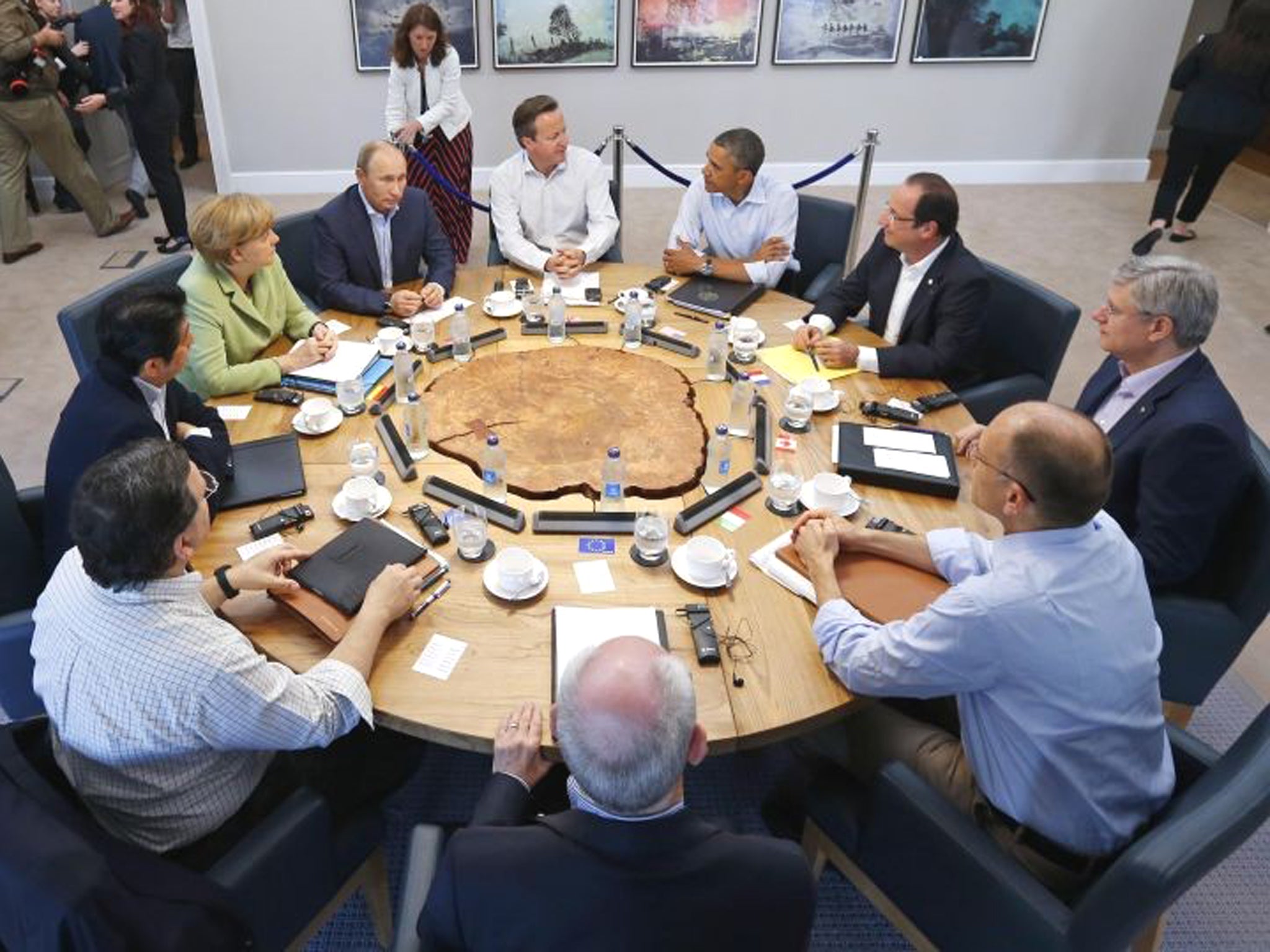G8: World leaders appeal to allies of Assad to force the Syrian President to surrender power
Loyalists could have a future in a new Syria if they topple their President

Your support helps us to tell the story
From reproductive rights to climate change to Big Tech, The Independent is on the ground when the story is developing. Whether it's investigating the financials of Elon Musk's pro-Trump PAC or producing our latest documentary, 'The A Word', which shines a light on the American women fighting for reproductive rights, we know how important it is to parse out the facts from the messaging.
At such a critical moment in US history, we need reporters on the ground. Your donation allows us to keep sending journalists to speak to both sides of the story.
The Independent is trusted by Americans across the entire political spectrum. And unlike many other quality news outlets, we choose not to lock Americans out of our reporting and analysis with paywalls. We believe quality journalism should be available to everyone, paid for by those who can afford it.
Your support makes all the difference.World leaders appealed to allies of Bashar al-Assad to force the Syrian President to surrender power at the close of their two-day summit in Northern Ireland.
The G8 nations papered over differences between Russia and the West by trying to revive peace talks in Geneva. But Vladimir Putin, the Russian President, stopped short of calling for Assad to go - the view of the seven other leaders.
Crucially, no date was set for peace negotiations, a delay which could give Assad more time to crush opposition fighters in the country's bloody two-year civil war. The G8 summit communiqué said only that negotiations should begin “as soon as possible.” Hopes they would re-start next month look likely to be dashed and the process could be delayed until September. One European diplomat said: “Events on the ground over the next four or five weeks will be important.” But British sources insisted the absence of a date was not a stalling tactic by Russia, and that setting a premature date would end in failure.
The G8 statement called for “agreement on a transitional governing body with full executive powers”, adding: “The public services must be preserved or restored. This includes the military forces and security services.”
The wording was a message to Assad loyalists that they could have a future in a new Syria if they toppled their President. David Cameron, who chaired the summit at Lough Erne, told a press conference: “Those loyal to Assad, who know he has to go but who want stability in their country, they should take note of this point.” He said maintaining Syria's security forces would “learn the lesson” from Iraq, where disbanding the army and police after the 2003 invasion left a vacuum exploited by al-Qa'ida.
British sources claimed that Russia had given ground behind the scenes, wanted a stable Syria and was not committed to propping up President Assad personally. They denied Mr Cameron had settled for a “lowest common denominator” approach to prevent a “G7 versus Russia” outcome at the summit.
“Our major priority is to help drive this political process. No one wants to see more conflict, no one wants to see more arms, no one wants to see more death,” said Mr Cameron. His words on arms were an apparent retreat from plans to supply them to the Syrian opposition - on which he may not be able to secure a House of Commons majority. He insisted no decision to send arms had been taken. “This is turning up the pace of political change that is needed in Syria…we have to turn these words into action,” he said.
The Prime Minister said: “I think it is unthinkable that president Assad can play any part in the future government of his country. He has blood on his hands, he's used chemical weapons.”
But Mr Putin laid bare the differences at his own post-summit press conference, when he urged the United States, Britain and France not to arm the anti-Assad rebels. Controversially, he cited the terrorist killing of Drummer Lee Rigby in Woolwich to make his case.
The Russian President declared: “Recently the British people suffered a huge loss. It was a tragedy next to his barracks on the streets of London. A violent assassination, a very brutal killing of a British serviceman.
”Clearly the opposition [in Syria] is not composed all of this but many of them are exactly the same as the ones who perpetrated the killing in London. If we equip these people, if we arm them what is going to control and verify who is going to have these weapons, including in Europe as well. So we call all our partners, before making this dangerous step, think about it very carefully.“
The G8 leaders, including Mr Putin, agreed that the United Nations should investigate the use of chemical weapons in Syria. Denying he was isolated, the Russian President claimed that some of the other eight leaders agreed with him that there was not yet proof the Assad regime had used such weapons. ”We had disagreements, that is true but I never felt lonely and Russia was never on its own in making a statement on Syria.“
Join our commenting forum
Join thought-provoking conversations, follow other Independent readers and see their replies
Comments